
views
Becoming a Professional

Audition for shows, movies and commercials. Look for casting calls for shows, movies, and commercials wherever you live. Every city has auditions, even the smaller ones! To find acting auditions, look at local online classifieds, visit local theaters, search social media, and create accounts on audition websites. Don't turn down jobs unless you think they might hurt your career. Show Business Weekly Magazine and Backstage advertise casting calls, offer the most up-to-date directory on agents and casting directors, and have a Theatrical Index detailing plays and musicals in various states of production. View Backstage's database of casting calls by city here: https://www.backstage.com/casting/open-casting-calls/.

Find a manager that can help your career thrive. Search local classifieds for managers that specialize in theater or film acting—whichever you are focusing on. Start sending your application to all of the mangers you narrow-down, and be prepared to explain your goals, your career plans, why you think you need a manager at this point in your career, and how a manger will help your success and growth. Applications should include a headshot, resume, cover letter, and demo reel. Be sure to address each manager personally in your cover setter and explain why you think they are a good fit. Prepare questions for your manager, such as, "How have you helped other actors grow their career?" and "How can you help my career in particular?"

Explore different styles of acting. No matter how great of an actor you are, learning outside of your comfort zone is a great way to get better. For example, if you're comfortable with dramatic roles, try comedy. Try and play characters that you aren't comfortable with and try out scripts in genres that you've never tried before. Some of the most important acting techniques are: Strasberg Stella Adler Chekhov Meisner Stanislavski Practical Aesthetics

Try a job in a related entertainment industry to build your network. Connections are important, and a great way to build them is within the industry—even if it's not acting at first. Try looking into jobs like a stuntman, lighting technician, or white collar job at a production studio. No matter what it is, take any opportunities you can to learn the industry. Many famous actors began in these kinds of jobs before they get their big break! Some job examples include editor, film sales agent, art department assistant, marketing assistant, music editor, painter, paramedical staff, and hair and make-up artists. Ask yourself: what do I enjoy doing most? Use your answer to this question to find the best job for you.

Move to a central acting hub to be closer to bigger projects. Los Angeles, New York, Sydney, Melbourne, and Mumbai are all examples of locations with lots of film and television jobs. Living in these cities is not a guarantee of success, but your chances are much higher when you're in the right place. Remember: when major movies use smaller locations for filming, local casting calls usually focus on secondary characters and extras. For lead roles, the big cities are your best bet. Don’t wait for talent scouts to hunt you down—go to them and show them what you've got!
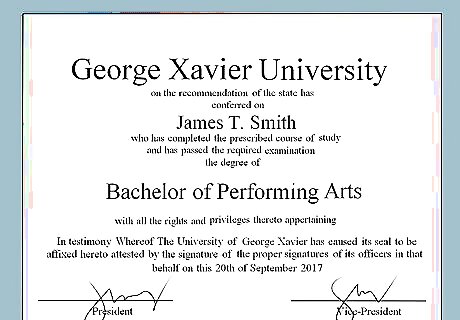
Obtain a Bachelor's degree in performing arts to increase your marketability. Performing arts degrees provide you with a mix of real-life experience and knowledge that can help you become a better actor and learn more about the profession. Gaining this experience will help you become more desirable to employers. Classes include Shakespeare Text, Audition Workshops, and Dramatic Techniques. Consider applying for a Master's degree after completing your Bachelor's. Master's degrees provide you with highly specialized training in acting. You can also choose to focus on other related areas instead, such as film, theater, and drama—all of which can be a great help in your acting career. Meet and talk to as many people as you can during your degree—this is just as important as what you learn! Take courses outside of acting, such as writing, singing and dancing. Some of the most successful actors are versatile and knowledgeable in other facets of the performing arts.
Gaining Acting Experience

Practice monologues on your own to build up your acting skills. If you're having trouble finding a gig, have patience and practice on your own! Separate monologues into different sections to make them easier. Any time there is a change in topic or thought, treat it like a different section. Ask yourself what the theme of each section is—this will help you remember them. Record yourself performing monologues and watch the footage after—this is a great way to find ways to improve.

Take part in community plays and skits. Whenever your local playhouse or school sends out a casting call, don’t be shy—apply! You’ll never get the part if you don't go to the auditions. You can also call local colleges, universities, and acting organizations and ask about plays and productions that have open positions. Getting into this routine will help you get better at acting and become noticed in your school or city. Lots of schools have regular meetups for kids interested in acting. Attend them and meet as many people as you can—this is a great way to find productions looking for actors and meet friends with the same interests. Ask a friend to videotape your performances—these videos will come in handy for your demo reel.

Join a talent organization to make new connections. Making connections can be tough, especially if you're looking for actors. If you're having trouble finding people that like acting as much as you, look for a local talent organization to join. These can give you lots of opportunities, such as discussion groups, events, and contests. Ask local elementary schools, high schools, universities, and community centers about the acting organizations they offer. Professional talent organizations are designed for actors with lots of experience. These include organizations like the Screen Actors Guild, Casting Society of America, and Actors Equity Association.

Look for unpaid acting gigs in your area through local classifieds. Visit websites like Craigslist and Kijiji and keep an eye out for paid and unpaid acting gigs. These positions list anything from jobs in movies, music videos, and fashion shoots. Check these listings regularly and contact as many people as you can. If you have any experience, be sure to include it in your resume! To narrow down your search, type in "volunteer actor" or "unpaid actor" within the "TV, Media, & Fashion" section on Kijiji, or "talent" and "tv/film/video/radio" section on Craigslist.

Make your own videos if you can't find someone that needs an actor. You don't have to stick to monologues either—come up with your own stories and film them! Ask your friends to help out and play different roles. Creating videos is a great way to find out what roles you're most comfortable in. It also gives you material for a demo reel until you get professional experience. Watch your videos when you're done and look for ways you can improve.

Hire a good acting coach to help you land more roles. Even if you're a good actor, an acting coach can help you get even better! Make sure you have a resume—big or small—before you talk to an agent. Ask your acting coach if they know about any upcoming plays and skits. Look for an acting coach that has experience in lots of entertainment fields (actor, agent, manager, etc.). When you're looking for coaches, ask them what kind of acting techniques they're familiar with, and what they can offer you. For example, if you want to be a theater actor, look for a coach with this kind of experience.
Building Your Portfolio

Hire a reputable agent. Look for local agents and do some research into their experience. Contact other actors they have worked with and ask about their personality and industry connections. Agents work with photographers to get your headshot ready, and then they'll pretty much take it from there. If you're busy and find you don't have time to promote yourself, agents are great choices They will send your headshot, show reel, and resume to casting agents to get you parts.
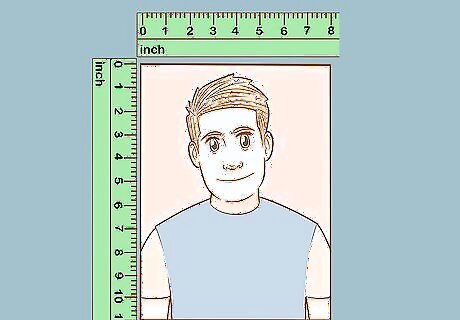
Get a clear 8 by 11 inch (20 cm × 28 cm) headshot. A headshot is the actors calling card and great way to show yourself off to casting directors. Find a photographer that you're comfortable with and has a personality similar to yours. For example, if you're shy and laid back—that's OK! Work with photographers that are similar and it will bring out the best in you. Check the website of potential photographers and look at their portfolio. Be sure to ask how much they charge for a session, how long each one lasts, and how many photos you get. Talk to your photographer—if something isn't feeling right or you're feeling uncomfortable, let them know. Try and look as natural as possible—pretend the camera isn’t even there. Focus on communicating your emotions through your eyes, and be as subtle as you can so nothing looks forced.
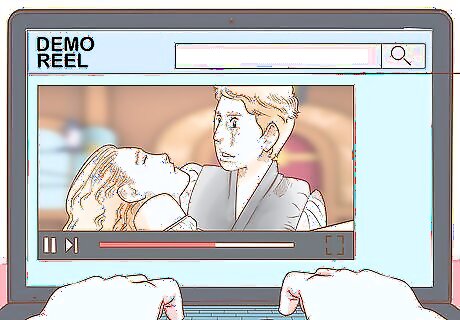
Create a demo reel with as much professional footage as possible. Keep your reel about 60 to 90 seconds in total and always start with your best scene. Try to include about 3 to 4 scenes. Mix up the genres to give casting staff an idea of your versatility. As a rule, about 75 percent of the reel should focus on you. If you don't have anything with good production quality and acting, try waiting until you do. Include your name, website, and e-mail at the beginning and end of the reel. Try to include footage from web series', student films, and independent films. Professional footage is best, but you're a beginner, any footage is fine—even footage that your friend takes! Keep in touch with the director, editor, and producer of all of your productions so that you always have enough resources for your reel. If you're ever low on quality footage, contact everyone you have worked with and ask them to help! Ask any television or film professionals you know for feedback on your reel. If you don't know any, ask your family and friends, or search online acting forums and post your reel.
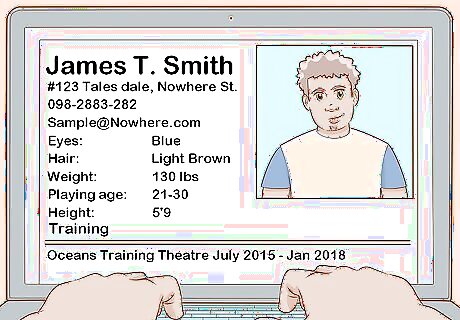
Create a concise resume with the appropriate information. Your resume should include your name, phone number, and email address is necessary, as well as your union status (EMC, AEA, SAG—AFTRA, SAG-eligible, or nonunion). You should also include all the acting experience that you have in areas of: commercials; film and television; broadway; regional theater; national tours; academic theater; training and degrees; specials skills. For all credits, include the title of the show(s), your role, as well as the directors and production companies. Don't worry about listing your age or general personal details—your audition will reveal these. For film productions, include physical characteristics like height, weight, and eye and hair color. If you're applying for a theater audition, you probably don't need to include these details. Include a link to your demo reels, personal website, and/or IMDb page if you have the room. If these additions are going to add unnecessary space, don't worry about including them.
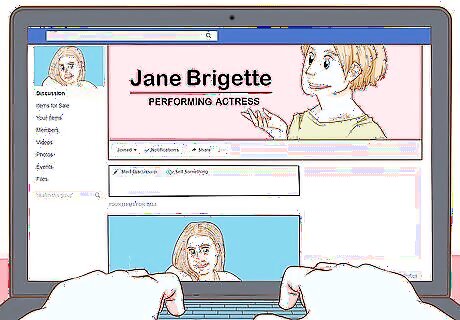
Advertise yourself through websites, social media, and YouTube. Post your demo reel and headshot on social media channels. You can also promote all the local and professional productions that you are in. Create a Facebook Fan Page and include information on your current and previous work, as well as your contact information. Connect with fans whenever possible—don't be shy! Post your acting work on YouTube and ask for feedback. Keep an eye on what videos get the most views.


















Comments
0 comment